I Love My Job: George Washington Portrayer Dean Malissa
The historical interpretive actor explains why you should drop everything and read George Washington’s Farewell Address. “It’s like the ink is still wet,” he said.
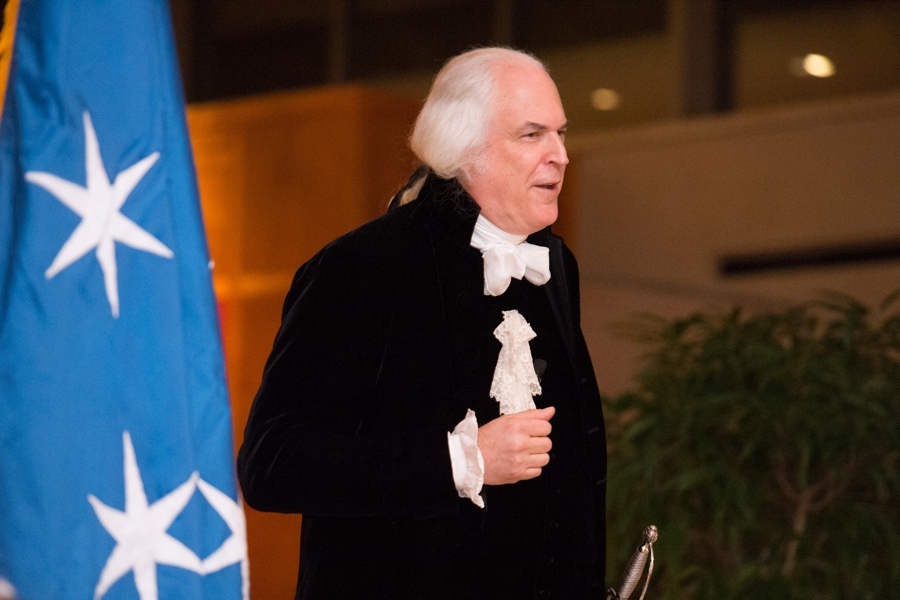
Dean Malissa. PhotographyByAlexander.com
Dean Malissa is the world’s leading portrayer of George Washington. The proper term for what Malissa does — dressing as Washington and speaking as him and essentially being him — is historical interpretive acting. Malissa has spent years studying the founding father and first president of the country to help people across the world gain access to the pivotal period of history when the United States of America was founded. But it’s not easy being an 18th century character in 21st century America, Malissa tells Philadelphia magazine. If you’re wondering how Malissa landed his job, how much time he spends in costume and what he’ll be doing this 4th of July, keep reading.
I grew up in… Cheltenham Township, a suburb just outside of Philadelphia.
I currently live in… Upper Moreland Township in the middle of the Pennypack preserve.
I first dressed as George Washington… in December of 2000.
I decided to officially “become” Washington when… well, I didn’t decide to become Washington. Washington decided to accept me. There was a gentleman named Bill Sommerfield who was the first official portrayer of Washington at Mount Vernon. I met him in 2000 through a mutual acquaintance. He was 70 years old at the time so he was already older than Washington was when Washington passed, not that you can’t continue portraying him. Any great manager is looking to replace themselves without fear or threat, so he was looking for his own hand-picked replacement.
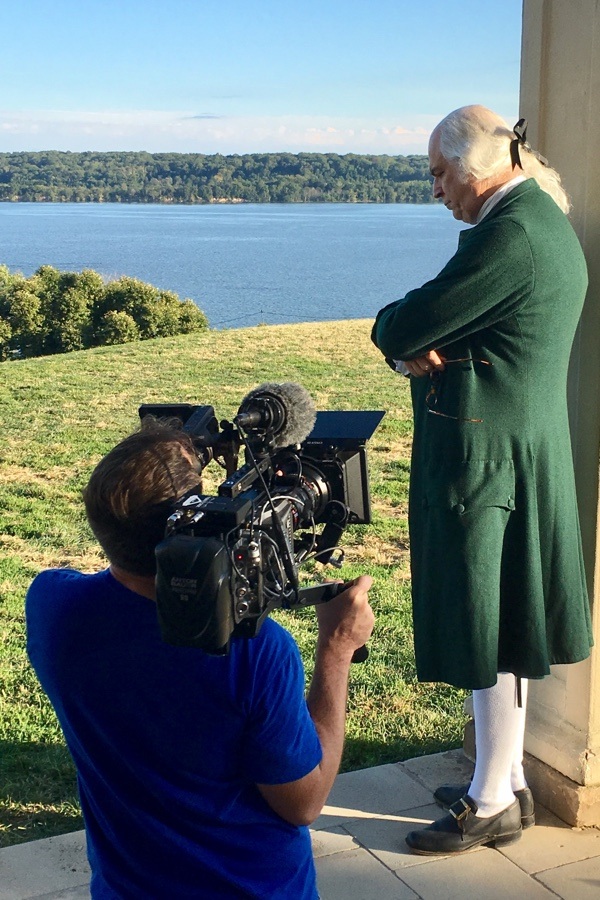
Dean Malissa has portrayed General Washington in TV productions for PBS, The Discovery Channel, NBC, National Geographic Channel and the Showtime Network; appeared on CNN and in films for the National Park Service, Mount Vernon, the U.S. Navy, The Bill of Rights Institute and the National Flag Foundation, according to his website. | Photo courtesy of Dean Malissa.
Something most people don’t know about George Washington is… his humanness. He had wants and worries like the rest of us. He was not this iconic marble bust on top of a pedestal.
My favorite time period in history is… the period from about 1870 to 1900. I’m smitten with it. It’s kind of the waning days of the Wild Wild West all the way to the Victorian-era in cities like New York City.
If I weren’t portraying George Washington, I’d be portraying… someone like Wild Bill Hickok. Again, that era has a great allure for me.
I left corporate America after 26 years because… I was always in business but I was never of business. I graduated university on a Saturday then I went to work for the company that I was with for 26 years that Monday. I went right to work and went from being a junior salesperson to being a senior vice president of sales and marketing with an equity position in the company. All that was good, and it afforded me a great lifestyle and the ability to educate my children, but I was never really of the world of business.
Something I miss about working in the corporate world is… an expense account. That’s my snarky answer. But my actual answer is I don’t miss a thing.
Acting has always attracted me because… well, I only acted in junior high school and high school. But I was in sales and marketing so one might argue that I was acting every day of my professional career. When I left corporate America in January of 1999, I hadn’t decided what I was going to be when I grew up.
I was in my mid 40s and got involved in a community theater production of the musical “Damn Yankees.” I was the new guy in the company, but I auditioned and got the lead role. I thoroughly enjoyed it — not as a little avocation but enjoyed it on a really profound level. I called my wife up and I said, “I’m going to become an actor.”
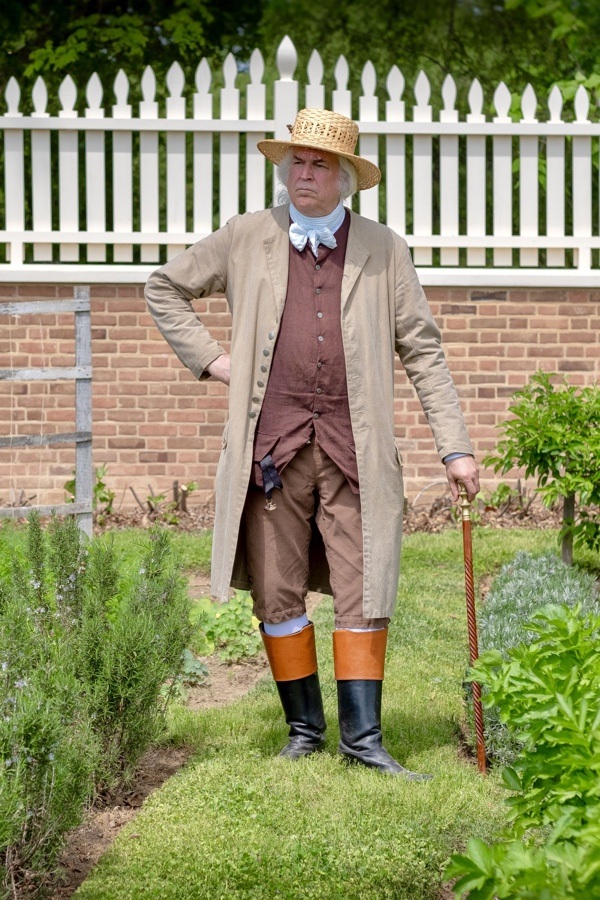
Farmer Washington. Photo by R. Shenk
The difference between acting and historical interpretive acting is that… almost all of historical interpretive acting is without a script. There is the odd engagement from time-to-time in which there is a scripted piece, like when I performed at a state dinner at the White House for the then president of France, Nicolas Sarkozy, during the George W. Bush administration.
In interpretive acting, you’re half actor and half scholar/historian. You need to be very facile and very intimate with the details of your character’s life and their contemporaries. You also have to be aware of worldview and you have to be aware of, in Washington’s case, things like farming and animal husbandry, and architecture, and engineering, and surveying, and the great republics of the past, and Greek and Roman classics, and military strategy and military tactics and more. Then you must have the ability to just pull from your knowledge and speak in their voice or what I envision Washington’s voice to be.
At Mount Vernon, George Washington’s estate and garden, I am the… official portrayer of General Washington. I’m there 50 to 70 times a year. I’m an independent contractor, but I’m their only guy for Washington. The other characters who appear at Mount Vernon are actually employees of Mount Vernon. I think Mount Vernon made a choice years ago, even before my time, that it didn’t want to be like Disney World where George Washington is there every day at 10 and noon and 2 and 4. Mount Vernon has Washington there for a lot of public events during the year and then a lot of private events. My work at Mount Vernon runs the gambit from coming out at the end of gala for five minutes of work to lead a toast, all the way to spending the entirety of the day with the public, speaking as Washington, telling stories about the formation of the country or about “my life.”
The most bizarre place I’ve traveled to portray Washington is… China, and that was a memorable event. I traveled on behalf of United Airlines. They had won the first ever capital-to capital-route — Washington D.C. to Beijing nonstop. On the first ever flight, the last two people they wanted to step of the jet in Beijing were the captain of the airliner, and… George Washington. [Laughs]
Being the world’s leading portrayer of George Washington is… very humbling, and I thank you for that affirmation. I will say that when I was a corporate guy at the end of my workday nobody applauded. At the end of my workday as George Washington people applaud and that’s a very nice thing.
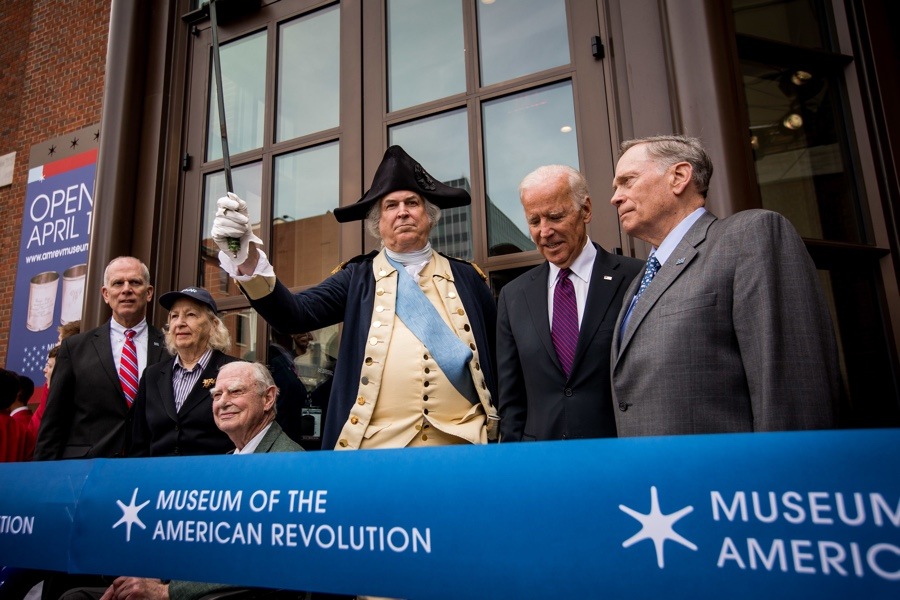
Dean Malissa with Joe Biden at Philadelphia’s Museum of the American Revolution. Photo: Museum of the American Revolution.
The key to successful historical interpretive acting is… being aware that your performance has two parts — content and process. There are two predominant groups of people that make up historical interpreters. One group comes from a history background and the other group comes from an acting background. I think the most successful ones come from an acting background, and they are interested and dedicated and passionate and intelligent enough to absorb the massive amount of information that they have to become facile with.
The other combination, and there are exceptions to this rule, tends to be problematic. People who come from a history background, and don’t seem to develop acting chops, become really deadly interpreters. They tend to want to tell one hundred percent. And once they are telling it, once the train has left the station, you can’t get it back. The people who have an acting background tend to be more aware of process. They know when they’re giving the audience too much information because the audience is giving the thousand-yard stare, or worse than that, they’re getting up from their seats and walking away. A person with a history background tends to be tone deaf to that.
One aspect of my acting I’m still honing is… the knowledge. Bill Sommerfield, my mentor, told me when I started: “The good news is you begin today, the bad news is it never ends.” And he was talking about the research. There are some subjects that I don’t take to naturally, so I really have to hone up on those. For example, surveying. I’m not a mathematically inclined individual, but Washington was. So surveying is the kind of thing I’m always trying to hone.
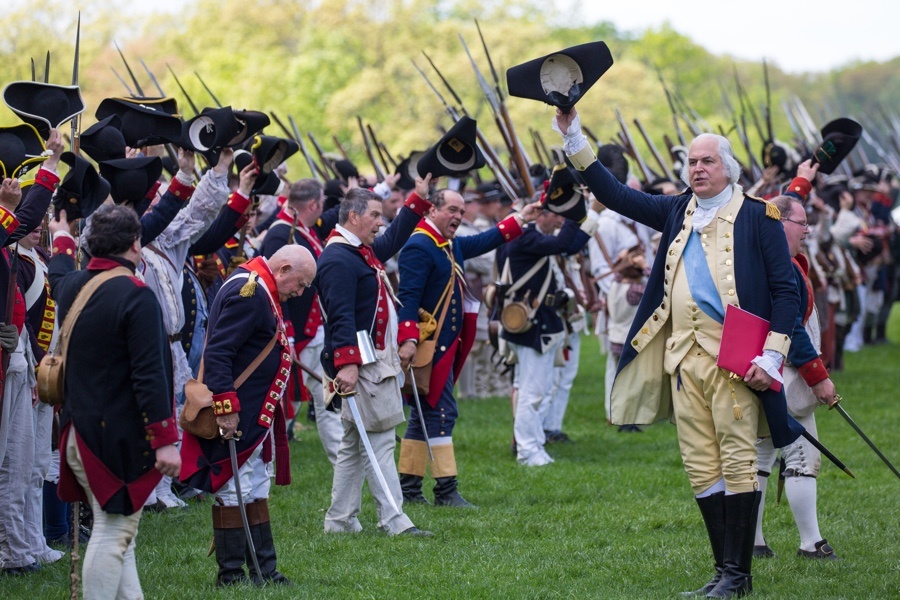
Photo by R. Shenk
On the 4th of July I… am always at Mount Vernon, and it’s a glorious day there. There are a large number of soldiers typically from the First Virginia Regiment of the Continental Line. They’re re-enactors, and Mount Vernon is kind of their home base. They come out in force, we have an inspection of the troops, and I speak to the audience that are assembled around the field, telling them what happened on that day, and what happened leading up to that day, and what happened after that day. And there is a formal reading of the Declaration of Independence.
There is a chance to meet the public and they ask questions. It’s also a chance to probably drink 25 bottles of water and sweat 10 pounds of your body weight because you’re wearing regimental uniforms — all wool — and it’s remarkable.
Something George Washington and I have in common is… on the very human side, we both have the potential for a bad temper, but we both work very hard to keep it reeled in and under control. I take that as meaning that we’re passionate about things. Washington’s personal credo was “deeds not words.” And while I talk for a living, I identify with that particular credo.
To dispel some of the biggest misconceptions about George Washington, I say… He never chopped down the cherry tree. He never threw a dollar across the Potomac River. He didn’t wear a wig. He didn’t routinely ride a white horse. He believed deeply in divine providence, but he was not a particularly prayerful man from a practicing standpoint. There’s also a wide belief in some corners that Washington was this uber mason. He wasn’t. He supported and believed in the Masonic movement, but he was a fairly inactive mason. He was pretty busy and didn’t have time to do a lot of stuff. And did I mention he did not have wooden teeth? He had dentures, but he didn’t have wooden teeth. They were made out of animal bones primarily.
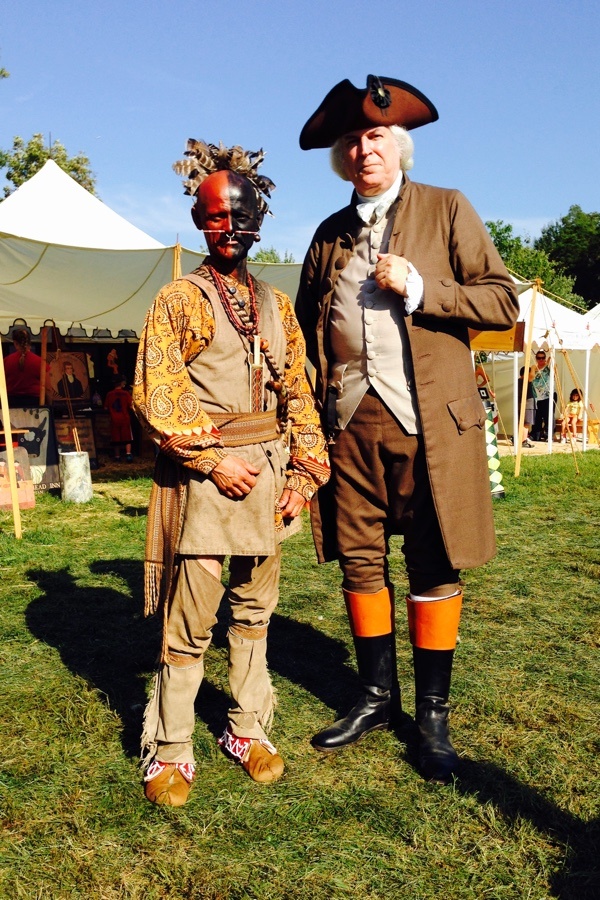
Photo courtesy of Dean Malissa.
When I’m at Valley Forge National Historic Park… I’m usually there for a pretty substantial event they have in mid-December called the March In. And then I’m there for various events like teachers’ workshops and community nights. It’s a mixed bag. I would hope to be able to do a little bit more in Valley Forge in the future.
If George Washington could see the United States today he’d probably… have the biggest smile you could imagine on his face once he saw the technology that exists in the country now. He loved new technology and the U.S. patent office, just last week, signed the 10 millionth patent granted in America. In Washington’s presidency, there were patents granted as well, but we just didn’t number them.
But that said, I would urge you and your readers to get a copy of George Washington’s Farewell Address and read it. In that Farewell Address, George Washington, with an almost eerily visionary eye, gives we Americans, future generations, his own generation and future generations, a list of suggestions and a list of warnings. Warnings of which we as a people, have without exception ignored every one. I think he would be a little heartbroken, and a little upset. If you go to the address, you’ll feel like you’re reading about events of today, like the ink is still wet.
When I’m not portraying George Washington I… sit alone a lot, happily since I generally tend to be with crowds. I enjoy reading and I’m a creator of terraria. It’s a very relaxing kind of thing for me. I’m a grandfather and a friend, and I socialize a bit. I tend to lean toward reclusiveness, and curmudgeonly nature.
I typically start my day by… making my bed. At the end of the day, if you haven’t done anything else, at least you can say you made your bed. Then I sit and read with coffee to start my day.

Dean Malissa. Photo courtesy of Dean Malissa.
The amount of time I spend in costume each year is… well, I worked 140 days last year, give or take. It changes year to year.
The hardest part about being someone else a lot of the time is… an inherent shortcoming of my work which is that we study and study and we surmise and we take our best shot, but we never truly know our character’s beliefs and values. We get a close as we think we can.
And to let the curmudgeon in me come out, the hardest part about portraying Washington is dealing with the behaviors of 21st century Americans. We live in a very, very, very (that’s three very’s!) graceless age. It’s very difficult as an 18th century character to deal with what is the perfect storm of ignorance, aggressive behavior, and entitlement that exists in the 21st century.
To those who are unhappy with their current jobs/careers I say… on the one hand, how important is the work that they’re doing? If it’s really important, that’s a factor in staying with it.
And how much do they need the things they get for their work, meaning money? If [money] is really important, then I would suggest they stay with it and find happiness in another direction.
But if the answers to those questions are that the work that I’m doing are perhaps not that important, and what I get out of it is not what I need, then you should be casting a wider net in life. Because I’m not the first one to say this, but nobody gets off this planet alive. And our time here is fixed, and doing something satisfying is important.
But this is another issue in the 21st century. We all believe that we are entitled to the pursuit of happiness. That’s not what founders meant. It didn’t mean go do whatever makes you feel great. The pursuit of happiness meant to do something that is productive. And by extension to make a living, and add to the prosperity of the nation. That’s what they meant by pursuit of happiness. It didn’t mean, I’m gonna go to the movies and put my feet up on the chair in front of me because that makes me happy.
I was speaking with David McCullough, the very famous historian and writer, and he told me about how in the 1700s and the 1800s, and up to the middle of the 1900s, we were a nation of people that got things done. We did stuff. We made stuff. And today, we complain. We talk about the things that aren’t getting done. And we whine. And I am in lock step with Mr. McCullough in that. So someone has to make a determination if they’re unhappy in their professional career whether they’re just whining, or whether it’s legitimate. If it’s legitimate, take action.
In 10 years I’ll be… 75 years old, and I hope that I will be continuing to engage in noble pursuits. Because I consider the work I do — which is, in essence, telling one of the most important stories ever told — to be noble work. I would like to continue to be engaged in some noble pursuit.


